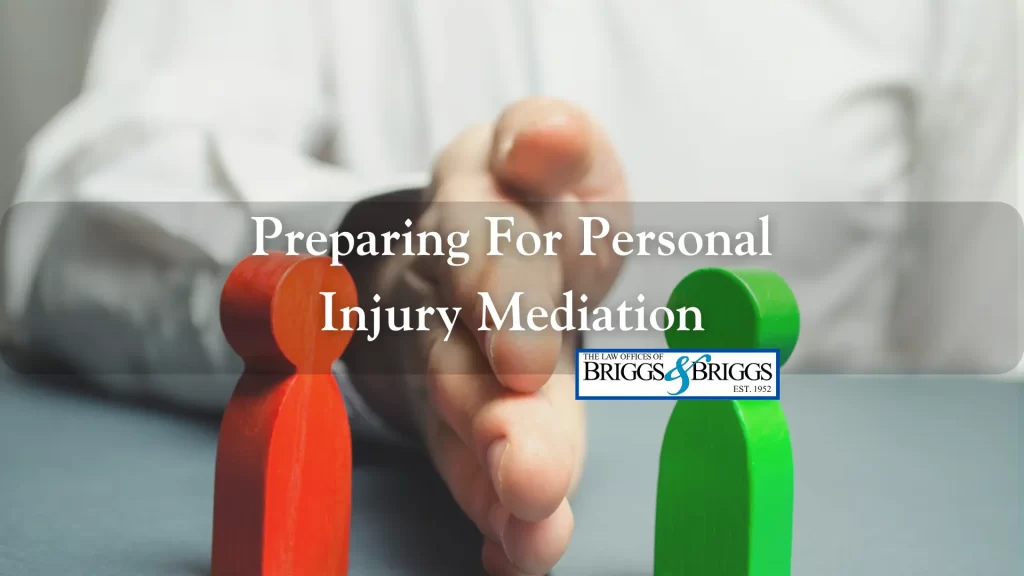Posted on Friday, September 8th, 2023 at 9:00 am

How do you prepare for personal injury mediation in Washington? Although the process is typically less intimidating than preparing for a trial, it can still be a stressful time for injured individuals. Mediation is an alternative form of dispute resolution where a neutral third party helps facilitate communication between two parties, encouraging them to reach a mutual agreement.
There are numerous benefits of mediation. At The Law Offices of Briggs & Briggs, we want to help demystify the mediation process and prepare you for what’s ahead.
Mediation, Demystified
Mediation can offer a fast and less stressful solution to your personal injury claim. Where does the process begin? First, you need to select a mediator. A mediator should be a neutral, third-party individual with a thorough knowledge of the mediation process. The role of a mediator is to facilitate meaningful communication between both parties to arrive at a mutually agreed-upon resolution. Mediators are often retired judges or private attorneys. Selecting a mediator means choosing an individual seen as neutral and credible by both sides. Your personal injury attorney can help you select an appropriate mediator and set a date that works for both sides.
What happens during the mediation process itself? Typically, the mediator lays out the ground rules for the process and introduces themselves and both parties. Both sides sign a confidentiality agreement because mediation is private and not a matter of public record like trials. With the formalities out of the way, the process begins. Each side can make opening remarks and present their case to the mediator.
Next, the mediator can focus on joint or private discussions between parties. During private discussions, the mediator separates each party and discusses their claims privately. The mediators then communicate each side’s concerns to the other, going back and forth and moving the parties toward resolution.
There are two potential outcomes of mediation. The first involves both parties negotiating and coming to an agreement. Agreements reached via mediation are legally binding once they’re written in a document and signed. Second, negotiations in mediation can fail, and a case can proceed to trial. In some cases, mediation is a condition that must be satisfied before a trial occurs.
The Neutral Guide: Role of a Mediator
A mediator is a communicator. Their job is to facilitate communication between both sides and keep each party engaged in the mediation process. A strong mediator knows how to help parties participate in meaningful conversations and get each side to share their goals and concerns. Through progressive discussions, a mediator helps each party look at a problem from all sides and suggests creative solutions to encourage compromise to arrive at a mutually beneficial solution for both parties.
A mediator does not take sides, and they do not work for the benefit of one party over the other. Mediators cannot coerce either party in any way or force them to come to an agreement that may contradict their needs. Mediators should conduct themselves according to high moral and ethical standards and facilitate their duties impartially.
Preparing Yourself for Mediation
 Preparing for mediation can seem daunting. However, that doesn’t have to be true when working with an experienced personal injury lawyer. Your lawyer can help you prepare for what’s ahead so you feel more comfortable with the process and equipped for what’s to come.
Preparing for mediation can seem daunting. However, that doesn’t have to be true when working with an experienced personal injury lawyer. Your lawyer can help you prepare for what’s ahead so you feel more comfortable with the process and equipped for what’s to come.
One of the best ways to prepare for mediation is to make notes and prioritize your issues. What do you want to accomplish? What are your goals? Are there concerns you want to be addressed before agreeing to a settlement offer? Making notes can help you organize your thoughts and understand what you want from the mediation process. It may help to make notes on your own and then share them with your attorney so your lawyer can help you articulate your goals and add items to your list you may not have considered.
Having an attorney as you prepare for mediation is vital because an attorney can help you collect and preserve evidence supporting your claim. Evidence is essential to building a solid claim and demonstrating why you deserve the compensation you are asking for from the other party.
Mediation is typically less formal than a trial. However, dressing the part and conducting yourself with composure shows that you respect the process and are serious about resolving your claim. First impressions count. Your attorney can offer advice on what to wear and how to speak, giving you the best chance of putting your best foot forward.
Navigating Tricky Questions: What Not to Say in Mediation
A mediator’s goal is not to trick or make you look bad. However, there are things you should express and opinions you must keep to yourself during mediation. Your attorney can help you plan ahead so that you know what questions or discussions might come up and are ready to answer them calmly and reasonably, no matter the subject. You must listen to both the mediator and the other party and think before you talk. Once the words are out of your mouth, you cannot return them. Flippant, aggressive, or dismissive remarks born from emotions instead of rational thought can damage your claim and standing.
Topics and comments to avoid include opinion statements and speculation. You need to present facts. Offering your opinion or making statements without evidence or substance to back them up can also hurt your claim. When in doubt, stick to the facts and let your lawyer guide the conversation.
Make the Most of Mediation. Bring an Experienced Personal Injury Lawyer
Setting realistic expectations can help you make the most of the mediation process. Having a lawyer by your side, guiding you through the process, can also help you achieve the most favorable result possible for your situation.
Talk to a Washington attorney with The Law Offices of Briggs & Briggs to recover the compensation you deserve. You can call our office at (253) 588-6696 and arrange a legal consultation with us today to learn more about mediation and your legal rights.
Related posts
When Can I Expect to Get My Settlement?
What Not to Say to an Insurance Adjuster
What Compensation Am I Eligible for After My Car Accident?
